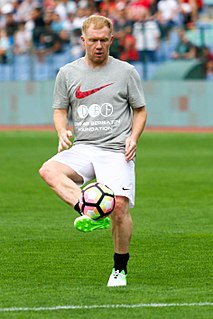Top 113 Quotes & Sayings by Paul Scholes - Page 2
Explore popular quotes and sayings by an English athlete Paul Scholes.
Last updated on November 4, 2024.
People say that Rooney could have been like Lionel Messi, a more prolific goalscorer who dribbles past opponents more. But they are different characters. You will never see Messi snapping around the heels of an opponent to win the ball back deep in his own half. Wayne does that all the time, and sometimes that enthusiasm will count against him.
When I started as a pro at United, I played alongside Bryan Robson in the A-team and later in the senior side. With Bryan, it didn't matter what level we were playing or which one of his team-mates got kicked. Within five minutes, you could guarantee that the opponent in question would be in a heap on the floor, courtesy of Bryan.
I am not ashamed to admit that in the games against Barcelona I spent a lot of the time just hoping he would take up positions as far away from me as possible. Elusive is the word that immediately springs to mind when I think about Messi's style of play. You think you have an eye on him and then - blink - he has gone, only to reappear somewhere else in space, with the ball.
I am not a man of many words, but I can honestly say that playing football is all I have ever wanted to do and to have had such a long and successful career at Manchester United has been a real honour. This was not a decision that I have taken lightly but I feel now is the right time for me to stop playing. To have been part of the team that helped the Club reach that 19th title is a great privilege.






















